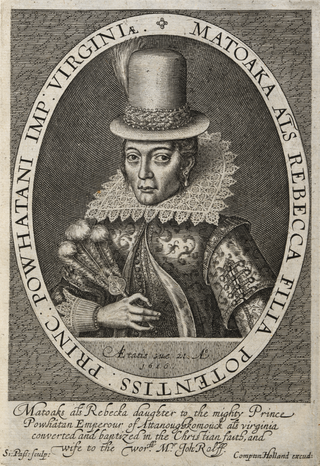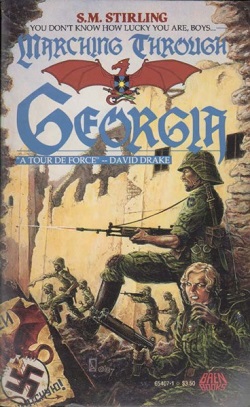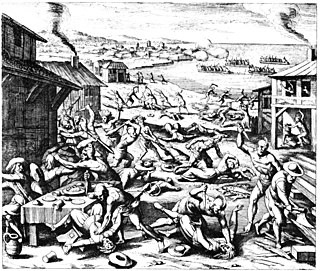
Alternate history is a subgenre of speculative fiction in which one or more historical events have occurred but are resolved differently than in actual history. As conjecture based upon historical fact, alternate history stories propose What if? scenarios about crucial events in human history, and present outcomes very different from the historical record. Some alternate histories are considered a subgenre of science fiction, or historical fiction.

Pocahontas was a Native American woman belonging to the Powhatan people, notable for her association with the colonial settlement at Jamestown, Virginia. She was the daughter of Powhatan, the paramount chief of a network of tributary tribes in the Tsenacommacah, encompassing the Tidewater region of what is today the U.S. state of Virginia.

The London Company, officially known as the Virginia Company of London, was a division of the Virginia Company with responsibility for colonizing the east coast of North America between latitudes 34° and 41° N.

John Rolfe was an English explorer, farmer and merchant. He is best known for being the husband of Pocahontas and the first settler in the colony of Virginia to successfully cultivate a tobacco crop for export.

Bernardino de Sahagún, OFM was a Franciscan friar, missionary priest and pioneering ethnographer who participated in the Catholic evangelization of colonial New Spain. Born in Sahagún, Spain, in 1499, he journeyed to New Spain in 1529. He learned Nahuatl and spent more than 50 years in the study of Aztec beliefs, culture and history. Though he was primarily devoted to his missionary task, his extraordinary work documenting indigenous worldview and culture has earned him the title as “the first anthropologist." He also contributed to the description of Nahuatl, the imperial language of the Aztec Empire. He translated the Psalms, the Gospels, and a catechism into Nahuatl.
Thomas Rolfe was the only child of Pocahontas and her English husband, John Rolfe. His maternal grandfather was Chief Powhatan, the leader of the Powhatan tribe in Virginia.

Sea Venture was a seventeenth-century English sailing ship, part of the Third Supply mission to the Jamestown Colony, that was wrecked in Bermuda in 1609. She was the 300 ton purpose-built flagship of the London Company and a highly unusual vessel for her day, given that she was the first single timbered merchantman built in England, and also the first dedicated emigration ship. Sea Venture's wreck is widely thought to have been the inspiration for William Shakespeare's 1611 play The Tempest.

First Families of Virginia (FFV) are the families in colonial Virginia who are socially prominent and wealthy, but not necessarily the earliest settlers. They descend from English colonists who primarily settled at Jamestown, Williamsburg, the Northern Neck and along the James River and other navigable waters in Virginia during the 17th century. These elite families generally married within their social class for many generations and, as a result, most surnames of First Families date to the colonial period.

Marching Through Georgia is an alternate history novel by American writer S. M. Stirling, the first of four books in the series The Domination. The novel was released in the United States on May 1, 1988.

Sir Thomas Gates was the governor of Jamestown in the English Colony of Virginia. His predecessor, George Percy, through inept leadership, was responsible for the lives lost during the period called the Starving Time. The English-born Gates arrived to find a few surviving starving colonists commanded by Percy, and assumed command. Gates ruled with deputy governor Sir Thomas Dale. Their controlled, strict methods helped the early colonies survive. Sir Thomas was knighted in 1596 by Robert Devereux, 2nd Earl of Essex for gallantry at the Capture of Cadiz. His knighthood was later royally confirmed by Queen Elizabeth I.

The Indian massacre of 1622 took place in the English colony of Virginia on 22 March 1622. English explorer John Smith, though he was not an eyewitness, wrote in his History of Virginia that warriors of the Powhatan "came unarmed into our houses with deer, turkeys, fish, fruits, and other provisions to sell us"; they then grabbed any tools or weapons available and killed all English settlers they found, including men, women, and children of all ages. Opechancanough, chief of the Powhatan Confederacy, led a coordinated series of surprise attacks that ended up killing a total of 347 people — a quarter of the population of the Colony of Virginia.

Vincent Colletta was an American comic book artist and art director best known as one of Jack Kirby's frequent inkers during the 1950s-1960s period called the Silver Age of comic books. This included some significant early issues of Marvel Comics' Fantastic Four, and a long, celebrated run on the character Thor in Journey into Mystery and The Mighty Thor.

The Spanish conquest of the Aztec Empire, also known as the Conquest of Mexico, the Spanish-Aztec War (1519–1521), or the Conquest of Tenochtitlan was one of the primary events in the Spanish colonization of the Americas. There are multiple 16th-century narratives of the events by Spanish conquistadors, their indigenous allies, and the defeated Aztecs. It was not solely a small contingent of Spaniards defeating the Aztec Empire but a coalition of Spanish invaders with tributaries to the Aztecs, and most especially the Aztecs' indigenous enemies and rivals. They combined forces to defeat the Mexica of Tenochtitlan over a two-year period. For the Spanish, Mexico was part of a project of Spanish colonization of the New World after 25 years of permanent Spanish settlement and further exploration in the Caribbean.
The Starving Time at Jamestown in the Colony of Virginia was a period of starvation during the winter of 1609–1610. There were about 500 Jamestown residents at the beginning of the winter; by spring only 61 people remained alive.
The Assiti Shards series is a fictional universe invented by American author Eric Flint. It is a shared universe concerning several alternate history worlds, related to a prime timeline. The defining characteristic of the fictional universe is the existence of the "Assiti Shards effect", and the impact that strikes by Assiti Shards have on characters in the stories. The series is rather large and expansive, having started publication in 2000, and as of 2008, consisting of 15 print books, and 21 e-magazine anthologies, in two different published timelines of the same multiverse.

In the Courts of the Crimson Kings is a 2008 alternate history science fiction novel by American writer S. M. Stirling.
The Nantucket series is a set of alternate history novels written by S. M. Stirling.

A Different Flesh is a collection of alternate history short stories by American writer Harry Turtledove. The stories are set in a world in which Homo erectus, along with various megafauna, survived to the modern times in the Americas as the Native Americans along with any other human cultures.

Counting Up, Counting Down is a collection of short stories by Harry Turtledove, most of which were first published in various fiction magazines in the 1990s. It is named after two of the stories appearing in the book, one called "Forty, Counting Down" and the other named "Twenty-One, Counting Up", which are united by the character of Justin Kloster. The story genres represented include alternate history, time travel, fantasy, straight historical fiction, and more. Two stories, "The Decoy Duck" and "The Seventh Chapter," are set in the Videssos Universe, with the former story being set before any of the other stories and books in that universe. The book was originally published by Del Rey as a trade paperback in January 2002. In the same month, it was brought out as a leatherbound limited edition by Easton Press.

Jamestown, also Jamestowne, was the first settlement of the Virginia Colony, founded in 1607, and served as the capital of Virginia until 1699, when the seat of government was moved to Williamsburg. This article covers the history of the fort and town at Jamestown proper, as well as colony-wide trends resulting from and affecting the town during the time period in which it was the colonial capital of Virginia.
















